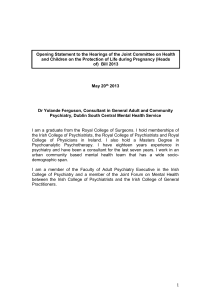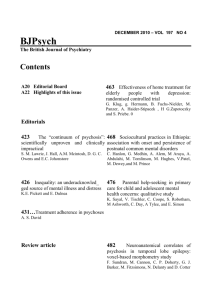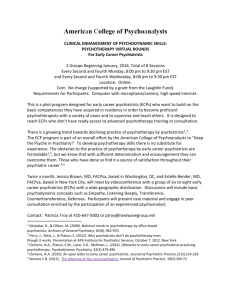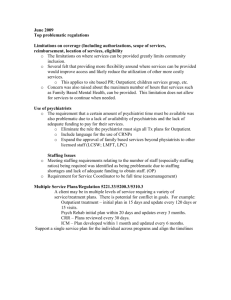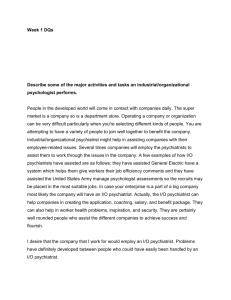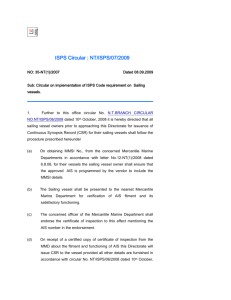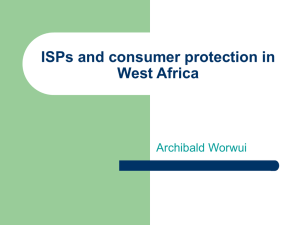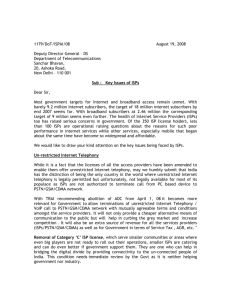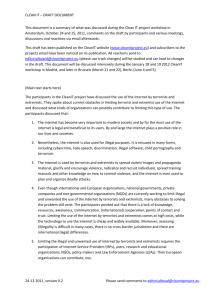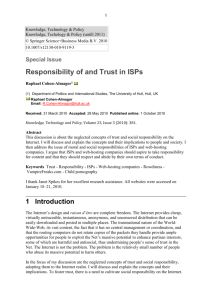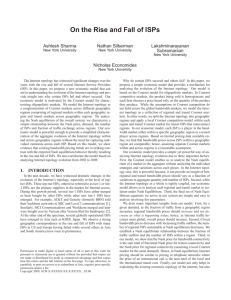Good Enough Psychiatry
advertisement
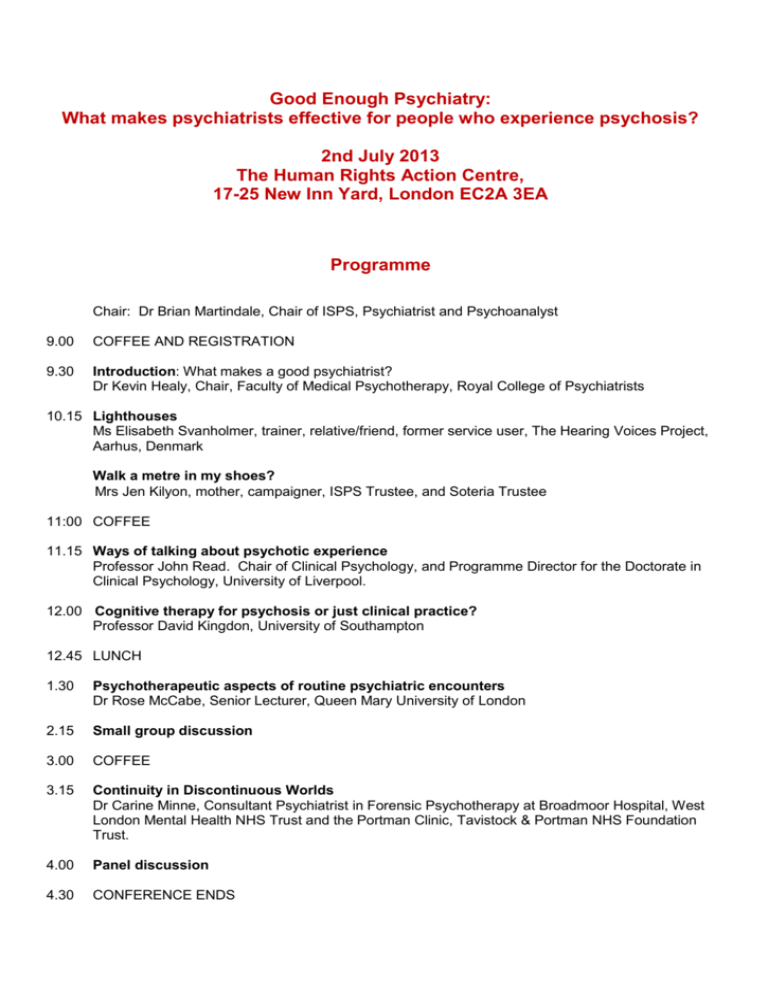
Good Enough Psychiatry: What makes psychiatrists effective for people who experience psychosis? 2nd July 2013 The Human Rights Action Centre, 17-25 New Inn Yard, London EC2A 3EA Programme Chair: Dr Brian Martindale, Chair of ISPS, Psychiatrist and Psychoanalyst 9.00 COFFEE AND REGISTRATION 9.30 Introduction: What makes a good psychiatrist? Dr Kevin Healy, Chair, Faculty of Medical Psychotherapy, Royal College of Psychiatrists 10.15 Lighthouses Ms Elisabeth Svanholmer, trainer, relative/friend, former service user, The Hearing Voices Project, Aarhus, Denmark Walk a metre in my shoes? Mrs Jen Kilyon, mother, campaigner, ISPS Trustee, and Soteria Trustee 11:00 COFFEE 11.15 Ways of talking about psychotic experience Professor John Read. Chair of Clinical Psychology, and Programme Director for the Doctorate in Clinical Psychology, University of Liverpool. 12.00 Cognitive therapy for psychosis or just clinical practice? Professor David Kingdon, University of Southampton 12.45 LUNCH 1.30 Psychotherapeutic aspects of routine psychiatric encounters Dr Rose McCabe, Senior Lecturer, Queen Mary University of London 2.15 Small group discussion 3.00 COFFEE 3.15 Continuity in Discontinuous Worlds Dr Carine Minne, Consultant Psychiatrist in Forensic Psychotherapy at Broadmoor Hospital, West London Mental Health NHS Trust and the Portman Clinic, Tavistock & Portman NHS Foundation Trust. 4.00 Panel discussion 4.30 CONFERENCE ENDS Good Enough Psychiatry: What makes psychiatrists effective for people who experience psychosis? Details of presentations Introduction: What makes a good psychiatrist? Dr Kevin Healy, Chair, Faculty of Medical Psychotherapy, Royal College of Psychiatrists I suggest that a good psychiatrist relates well, contains anxiety, uses knowledge thoughtfully, leads by example, conveys understanding and encourages development. I explore how these characteristics arise from nature and nurture and link this exploration to RCPsych position statements and to current knowledge from the neurosciences. I specifically explore what is known as right brain to right brain communication in the developmental neurosciences and challenge other speakers to do likewise in their contributions throughout the day. Experiencing psychiatry: service user and family perspectives Lighthouses Ms Elisabeth Svanholmer, trainer, relative/friend, former service user, The Hearing Voices Project, Aarhus, Denmark During my years as a service user I met many whose intentions were to help me. But I only met a few who actually managed to connect with me and make a difference. I would like to share stories and reflections about my relationships with those wonderful people. Walk a metre in my shoes? Mrs Jen Kilyon, mother, campaigner, ISPS Trustee, and Soteria Trustee I will talk about my experiences as a mother who has been stuck far too long in the mental health system. Many of my encounters with psychiatrists have been difficult, but I will focus on interactions that have been helpful. Ways of talking about psychotic experience Professor John Read. Chair of Clinical Psychology, and Programme Director for the Doctorate in Clinical Psychology, University of Liverpool. Assessment, diagnosis and formulation are in themselves interventions, which may or may not be helpful therapeutically. Naming, categorizing and explaining people’s experience can have effects on identity, self-stigmatization, and self-efficacy. Is it always necessary to offer diagnoses? What impact do different explanatory models have? This presentation will discuss these issues and consider the evidence for different approaches, and possibilities for working with an integrated, nonbiologically loaded, formulation based approach. Cognitive therapy for psychosis or just clinical practice? Professor David Kingdon, University of Southampton Cognitive therapy for psychosis developed in clinical settings and has been evaluated as an effective therapeutic intervention especially in people with persistent distress and disability. A fundamental component of its application is the development of a good therapeutic relationship but does CBT assist with this or add anything over and above ‘good clinical practice’? Psychotherapeutic aspects of routine psychiatric encounters Dr Rose McCabe, Senior Lecturer, Queen Mary University of London Communication between psychiatrists and people with psychosis varies considerably in practice. I will present findings from micro-analysis of video recorded outpatient psychiatrist-patient encounters and examples of how psychotherapeutic aspects are integrated into these encounters. Continuity in Discontinuous Worlds Dr Carine Minne, Consultant Psychiatrist in Forensic Psychotherapy at Broadmoor Hospital, West London Mental Health NHS Trust and the Portman Clinic, Tavistock & Portman NHS Foundation Trust. This talk will address the importance of providing long term continuity of treatment, and treaters, to certain patients suffering from chronic, enduring mental disorders. This offers those patients the chance to make mental structural changes, which otherwise remain unchanged with short term treatments, meaning that relapses are more frequent and possibly more severe. I will illustrate what I mean by presenting a case treated over many years, where I will describe the mental structural changes made, using the OPD (Operationalised Psychodynamic Diagnostics) system. Good enough psychiatry What makes psychiatrists effective for people who experience psychosis 2nd July 2013, The Human Rights Action Centre, 17-25 New Inn Yard, London EC2A 3EA Title: Prof / Dr / Mr / Mrs / Ms / Miss Surname: First Name: Job title & Organisation (if applicable): Address: Post Code: E-mail Tel No: Please tick here if you would like your e-mail address included on the delegate list distributed at the conference Special dietary requirements: Disability issues: Conference Delegate Fee (includes light lunch) Non-members ISPS UK member** £145 £115 Subsidised rate (unwaged service users and carers) £40. Please also enquire about free places. ISPS UK Member Yes/No Please indicate if you have benefitted from a free or subsidised place at a previous ISPS UK Conference (**For ISPS UK membership rates and information please go to www.ispsuk.org or e-mail admin@ispsuk.org) Donations Would you like to donate to the ISPS UK bursary fund to help subsidize free places at ISPS conferences for unwaged service users and carers? Yes / no. If yes, amount:_______________________ I am a UK taxpayer and would like ISPS UK to claim gift aid Payment (required in advance of conference): Payment Options 1. Please find a cheque attached for £_______________ (made payable to ISPS UK) 2. Please debit £______________ from the following credit**debit card ** Please note, there is an additional 3% charge for non-debit cards NB. Please do not e-mail your form if it contains card details – please post or ring the office – 0845 166 4168 with details Card type:_________________________Card number:____________________________ Start date:_________________________Expiry date:_____________________________ Name on card:_____________________3 digit security number:____________________ 3. Please invoice for the attention of: Name: Amount: Invoice address (if different from above) ______________________________________________________________________________________ 4. Or pay on line via ISPS UK website (using Paypal) Please return completed form to: Ali Haddock, ISPS UK, PO Box 7383, Bozeat, Wellingborough, Northants NN8 9FB or e-mail to admin@ispsuk.org For further information, please contact Ali Haddock on 0845 166 4168

